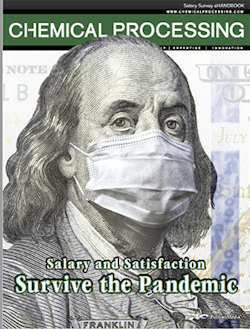The results are in and they’re a bit of an anomaly. For one, this year’s salary and job satisfaction survey just happened to fall right in the middle of a global pandemic. As countries went into lockdown, businesses shuttered and economic uncertainty loomed. We acknowledged this might lead to some statistical challenges. We also received a lower-than-usual number of responses that could potentially impact the data pool. So, we expected results to not reflect the ‘usual’ year-to-year comparisons. Having said that, the data surprisingly are on par with last year with just a few dips in numbers compared to 2019.
Download the PDF of the 2020 Salary Survey to gain access to all the charts and web-exclusive content including a look ahead for the industry, grateful workers, staffing concerns as well as advice for aspiring chemical engineers.
>> Download it now.
So, let’s dive in. First off, for 2020, chemical engineers report an average salary of $113,100, down slightly from last year’s $113,699 — although not that much probably should be read into the drop given the survey’s margin of error. However, the figure still exceeds 2018’s and previous year’s numbers. This pattern also held for raises: In 2019, survey participants revealed an average raise of 4.28%; in 2020 the average is 4.12%. Two years ago, the average was 3.9%.
“I feel good about the benefits I receive and the annual bonuses/raises. However, current raise is delayed due to the virus,” shared one participant.
Indeed, the COVID-19 virus has had an impact on raises and bonuses: last year, we reported the highest average bonus intake at $7,354. Previous years delivered bonuses of $6,887 (2018) and $6,568 (2017). For 2020, the average bonus fell to just $6,101. In addition, the number of respondents receiving a bonus of $1,000 or less rose to 36.4% from 25.4% last year.
One respondent mentioned a bonus reduction of 33%, and “merit raises for 2020 were cancelled after they were established. Furloughs amount to additional 4% annual pay cut through May 2020.”
COVID-19 Impact
This year, we added specific questions about the effect of the pandemic. Despite the downward salary and compensation adjustments, according to most respondents, the pandemic hasn’t significantly impacted their salary and work in the chemical industry. In fact, 72% said COVID-19 hasn’t impacted their salaries at all. However, the next largest percentage of respondents (14%) expressed receiving a pay cut of more than 10%. Another 7% claimed a pay cut between 5 and 10%.
More than half of survey participants describe work hours as unchanged; 23% saw their hours reduced and 21% are working more hours.
We also asked how the virus affected work situations and 89% commented they are still working, with over half doing their jobs in a different manner. For example, 41% said they are currently working remotely full time; 25% split their days between on-site and remote work; and 23% note it’s “business as usual” working on-site.
“The pandemic has caused me to work from home full time for the last two months, which may lead to more work-from-home opportunities in the future,” noted one worker.
“The only benefit I’d like which I don’t currently receive is the ability to work from home. I am doing so during the current, ongoing COVID-19 pandemic and find it a much better environment more conducive to getting work done,” said another.
Indeed, many of our survey participants foresee more remote work in the future.
“There is a definite chance that working remotely/from home and virtual meetings will be considered as a permanent feature of our work life,” mused one respondent.
While most saw no major impact to their work, 3% reported being temporarily furloughed and 3% noted they had lost their jobs.
“During the pandemic I am limited to 8-hour days — no overtime,” shared one worker.
Where Results Came From
A total of 709 people participated in this year’s survey. (This response is down from last year’s, but many surveys seem to be suffering declines during the pandemic.) From May through June, respondents accessed the survey questionnaire via ChemicalProcessing.com, e-newsletters and e-mail blasts sent to subscribers.
>> Download the PDF of the 2020 Salary Survey
By downloading the survey, you'll gain access to all the charts and web-exclusive content on grateful workers, a look ahead regarding the economy and staffing concerns many survey respondents have regarding the chemical industry as well as advice for aspiring chemical engineers.
About the Author
Amanda Joshi
Managing Editor
Amanda Joshi has more than 18 years of experience in business-to-business publishing for both print and digital content. Before joining Chemical Processing, she worked with Manufacturing.net and Electrical Contracting Products. She’s a versatile, award-winning editor with experience in writing and editing technical content, executing marketing strategy, developing new products, attending industry events and developing customer relationships.
Amanda graduated from Northern Illinois University in 2001 with a B.A. in English and has been an English teacher. She lives in the Chicago suburbs with her husband and daughter, and their mini Aussiedoodle, Riley. In her rare spare time, she enjoys reading, tackling DIY projects, and horseback riding.


